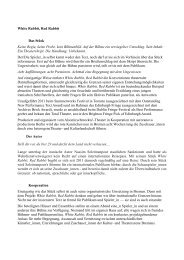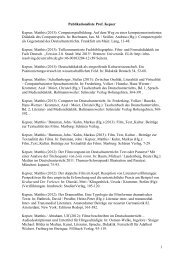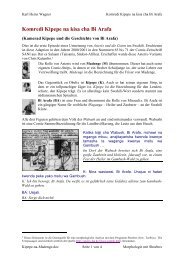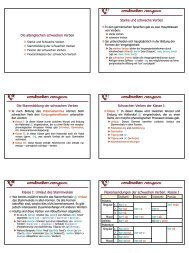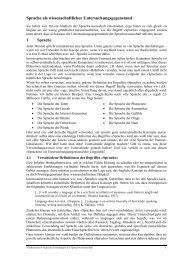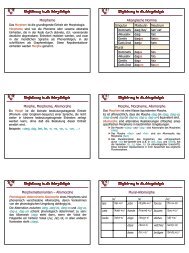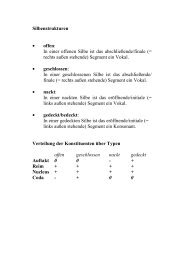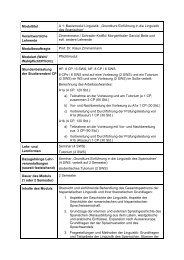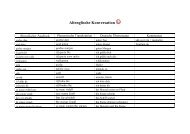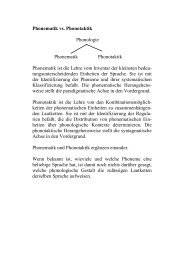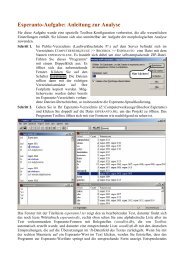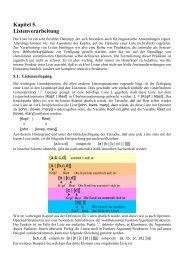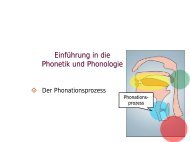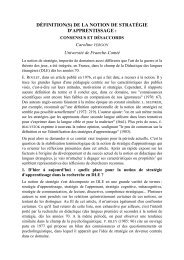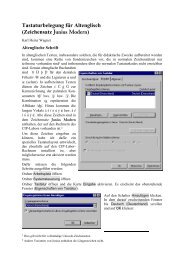Relativism and Universalism in Linguistics - Fachbereich 10 ...
Relativism and Universalism in Linguistics - Fachbereich 10 ...
Relativism and Universalism in Linguistics - Fachbereich 10 ...
You also want an ePaper? Increase the reach of your titles
YUMPU automatically turns print PDFs into web optimized ePapers that Google loves.
164 Workshops<br />
Reports <strong>and</strong> quotatives <strong>in</strong> the diachronic evolution<br />
of the Italian pare / sembra evidential pair<br />
Squart<strong>in</strong>i, Mario<br />
Università di Tor<strong>in</strong>o<br />
msquart@yahoo.com<br />
Aikhenvald (2004: 177-178) describes grammatical systems <strong>in</strong> which a general reportive<br />
marker coexists with a more specific quotative form, the latter specify<strong>in</strong>g the exact source of<br />
the quoted report. Elaborat<strong>in</strong>g on Aikhenvald’s dist<strong>in</strong>ction it will be argued that a formal<br />
opposition report / quotative is not only applicable to synchronic descriptions of grammatical<br />
systems but is also relevant <strong>in</strong> diachronic analyses of semi-grammatical items such as the<br />
Italian verb pair pare / sembra ‘seem’.<br />
In particular it will be demonstrated that the evidential mean<strong>in</strong>g of pare, which is restricted to<br />
<strong>in</strong>ferences <strong>and</strong> general reports <strong>in</strong> Modern Italian, also occurs <strong>in</strong> quotative contexts <strong>in</strong> Old<br />
Italian. The diachronic evolution of pare, as well as its only partially overlapp<strong>in</strong>g distribution<br />
with sembra, will be described <strong>in</strong> detail on the basis of corpus data <strong>and</strong> compared with the<br />
behaviour of correspond<strong>in</strong>g forms <strong>in</strong> other Romance languages such as Spanish parecer (see<br />
Cornillie 2004). More generally, the data will be considered with respect to the follow<strong>in</strong>g still<br />
heavily debated issues:<br />
• the <strong>in</strong>terplay between epistemicity <strong>and</strong> evidentiality (as noted by Aikhenvald 2004:<br />
193 reportive evidentials “can develop an epistemic extension of unreliable<br />
<strong>in</strong>formation as a means of shift<strong>in</strong>g responsibility”, which is the case with the Italian<br />
verbs pare / sembra);<br />
• the role of lexical evidentiality <strong>and</strong> the cont<strong>in</strong>uum between lexical <strong>and</strong><br />
(semi)grammatical forms (the two verbs <strong>in</strong>volved, pare <strong>and</strong> sembra, both belong to<br />
the closed class of rais<strong>in</strong>g verbs but show different degrees of semantic bleach<strong>in</strong>g, a<br />
possible clue of grammaticalization);<br />
• the relationship among different evidential submean<strong>in</strong>gs (like Spanish parecer, Italian<br />
pare / sembra cover not only reports but also other <strong>in</strong>direct modes of know<strong>in</strong>g such as<br />
<strong>in</strong>ferences).<br />
References<br />
Aikhenvald, Alex<strong>and</strong>ra (2004). Evidentiality. Oxford: Oxford University Press.<br />
Cornillie, Bert (2004). Evidentiality <strong>and</strong> epistemic modality <strong>in</strong> Spanish (semi-) auxiliaries. A<br />
functional-pragmatic <strong>and</strong> cognitive-l<strong>in</strong>guistic account. Doctoral dissertation, Faculteit<br />
Letteren, Katholieke Universiteit Leuven.<br />
Realizations of <strong>in</strong>direct evidence <strong>and</strong> probability <strong>in</strong> English <strong>and</strong><br />
Lithuanian<br />
Usonienė, Aurelija<br />
Vilnius University<br />
aurelia@usonis.lt<br />
The paper is devoted to the analysis of quantitative <strong>and</strong> qualitative parameters of equivalence<br />
between the lexical expressions of epistemic qualification of evidentiality <strong>and</strong> probability <strong>in</strong><br />
English <strong>and</strong> Lithuanian. The paper will look at realizations of the source of knowledge <strong>in</strong><br />
terms of <strong>in</strong>directness of evidence <strong>and</strong> whether/how it is related to probability. The focus will<br />
be on the mean<strong>in</strong>g <strong>and</strong> function of the Lithuanian ‘quotative’ particle ESĄ (‘participialbe’), the



